Updated 9 months ago
Best Solar Battery Backup Systems for Homes in 2025: Choose the Right One for You
Written by
Ben Zientara
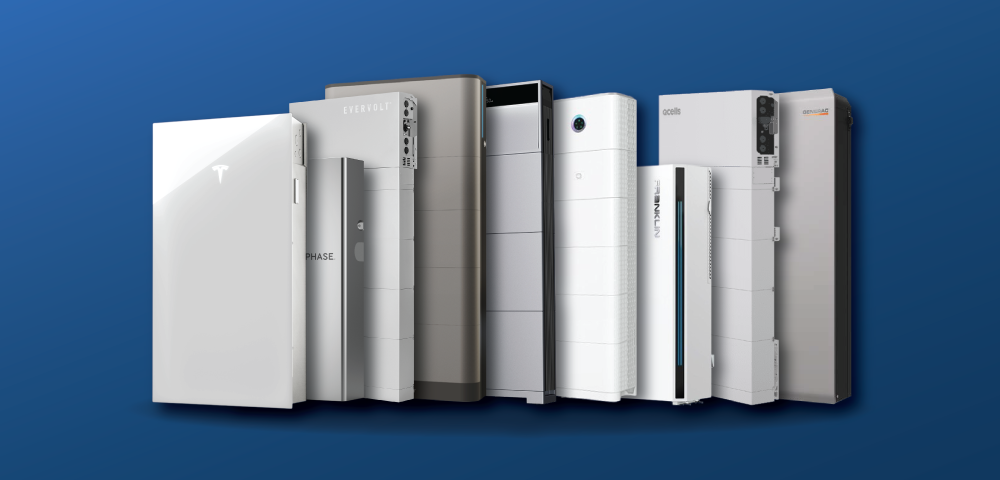
How much do solar batteries cost near you?
Getting home energy storage can be a complicated decision, and we advise people to work with a reliable installer to make the right decision for their needs. But there are so many options on the market; how do you know if the installer you’re working with will carry the best brands? That’s where our experts come in.
Here are our picks for the 10 best home solar batteries of 2025:
Rank | Company | SolarReviews rating | Best solar battery |
|---|---|---|---|
1 | Tesla | Elite | Powerwall 3 |
2 | Enphase | Elite | IQ 5P |
3 | Panasonic | Elite | EverVolt |
4 | Canadian Solar | Excellent | EP Cube |
5 | Anker | Excellent | SOLIX X1 |
6 | PointGuard | Excellent | PointGuard Home |
7 | FranklinWH | Excellent | aPower 2 |
8 | Qcells | Excellent | Q.HOME CORE |
9 | Generac | Excellent | PWRcell 2 |
10 | BYD | Very Good | Battery Box HVL |
Bottom line on the best solar batteries
A home solar battery should be tailored to your specific energy needs, which means that energy storage systems that can be customized with regard to battery capacity, power output, solar input, and installation location get our highest recommendation.
Here are our recommendations for finding a home solar battery system that fits your needs.
If you live in an average house with natural gas heat and are looking for the best all-in-one solar battery alongside a new solar installation, choose the Tesla Powerwall 3.
If you want the most affordable battery in our top 10, choose Canadian Solar EP Cube.
If you value sleek design in an ultra-powerful package, choose the FranklinWH Home Power System.
If you want the most future-proof battery, which will be endlessly expandable and someday be able to draw on your EV’s battery capacity, choose the PointGuard Home battery.
Finally, if you want customizability with huge power output, choose the Enphase Energy System with IQ 5P batteries.
That was the bottom line, but there’s a lot more to learn about the best solar batteries for homes in 2025!
10 Best Solar Batteries of 2025
Ultimately, the best solar battery for you will depend on your specific needs. But we would recommend any of the batteries on our top 10 list.
Here’s a rundown of the 10 best solar batteries according to our experts, including why we chose them and their pros and cons.
#1: Tesla Powerwall 3
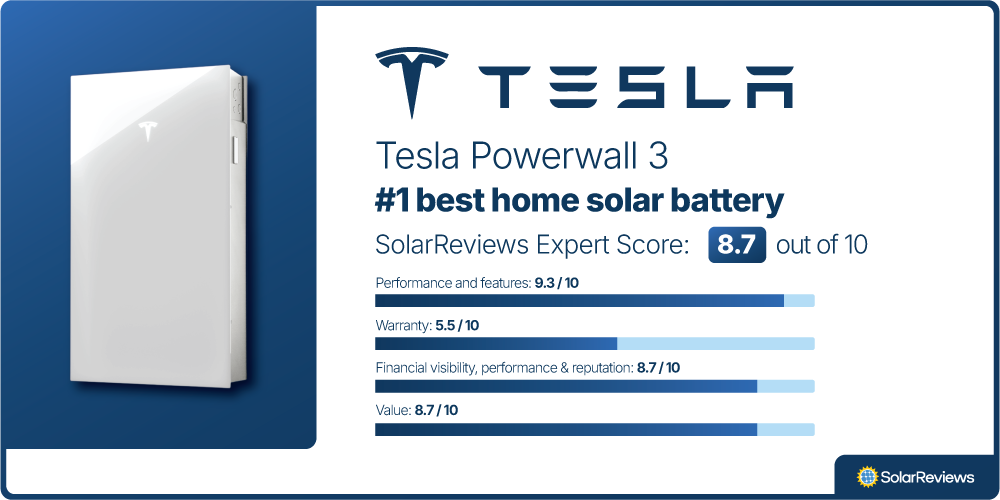
Tesla is often credited with making lithium-ion home storage mainstream thanks to its ultra-sleek, reasonably priced Tesla Powerwall. Now in its 3rd generation, the Powerwall is the most popular home battery on the market, and with good reason!
Powerwall 3 functionality, pricing, and ease of installation make it a top choice for anyone looking for a solar battery.
#2: Enphase IQ 5P
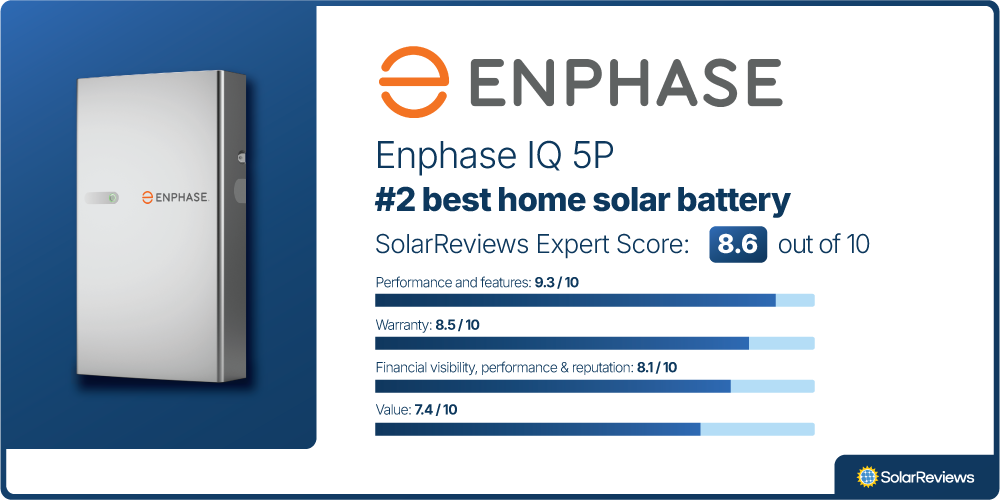
The Enphase Energy System with IQ 5P batteries is our pick for the 2nd best home solar battery of 2025. We’re not the only ones who like Enphase batteries — a whopping 74% of solar installers now install Enphase batteries, according to our 2025 Solar Industry Survey.
The IQ 5P’s power output, design flexibility, 15-year warranty, and popularity among solar installers earned it a high spot in our rankings.
#3: Panasonic Evervolt Home Battery
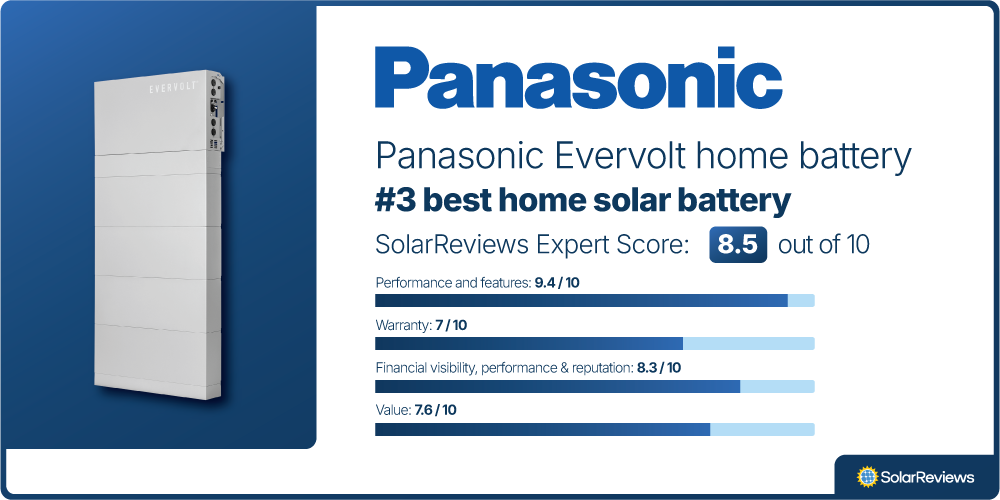
Consumers are no strangers to Panasonic. The popular electronics brand is known for its quality, and its energy products are no different.
The modular Panasonic Evervolt Home Battery system compares favorably with the other batteries in our top five with its design flexibility, allowing homeowners to get precisely what they want out of the system.
Note: On April 28, 2025, Panasonic North America announced it would discontinue its solar and battery storage offerings. The company has said it is committed to long-term warranty support for existing customers as well as customers with installations in progress. While we still the utmost have confidence in Panasonic's warranty coverage, people who have not yet signed a contract should consider the other brands on our list as an alternative.
#4: Canadian Solar EP Cube
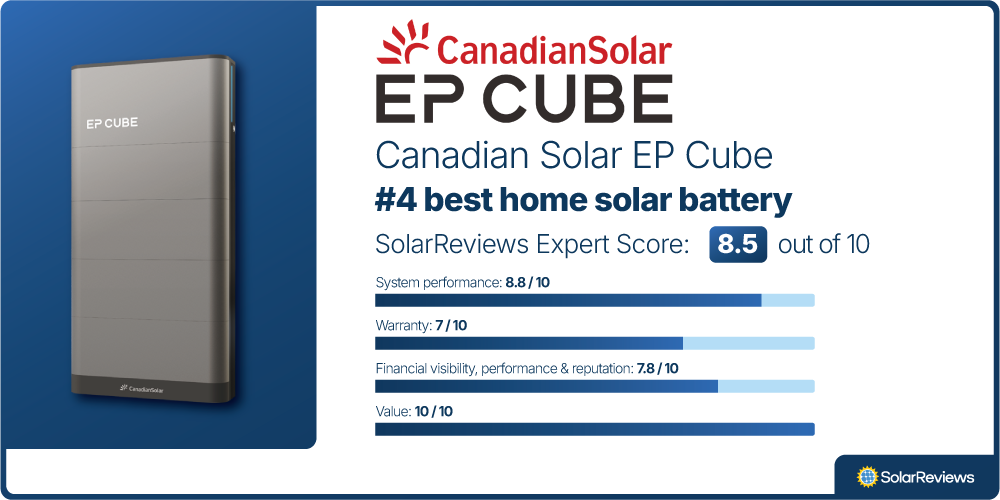
The introduction of the Canadian Solar EP Cube in 2022 was one of the most exciting announcements of the year. The EP Cube carries on Canadian Solar’s tradition of offering great performance at a moderate price point.
This excellent value, warranty, and Canadian Solar’s sterling reputation among installers and financiers earn the EP Cube the fourth spot in our 2025 ranking.
#5: Anker SOLIX X1
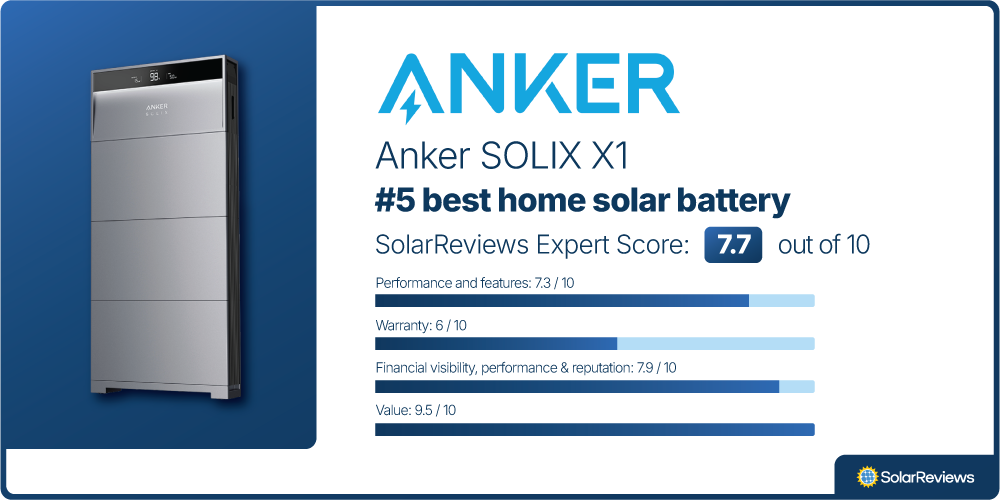
In 2023, popular consumer electronics brand Anker introduced their SOLIX X1 home energy storage system, immediately grabbing headlines (and inking installation company deals) on the strength of its branding, design, and usability.
Now in its second year, Anker is ramping up its efforts to get the SOLIX X1 into homes, and we’re impressed enough with the battery and its parent company’s hustle to award 5th place this year to the SOLIX X1.
#6: PointGuard Home
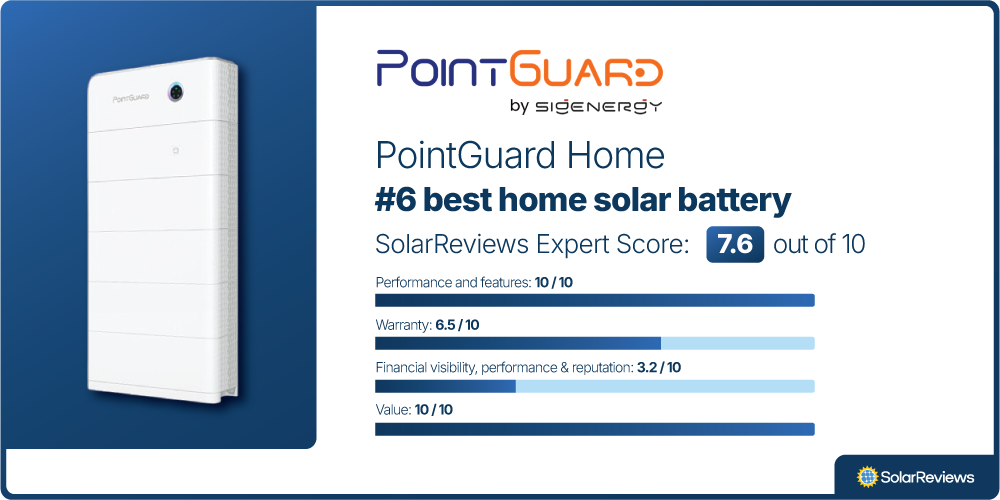
PointGuard is a relatively new company in the U.S., but its worldwide parent company Sigenergy has been making and selling its impressive home energy storage and solar products in Europe for some time.
We’ve been impressed by what we’ve seen from PointGuard, and as the company has expanded into multiple states throughout late 2024, installers are impressed, too.
#7: FranklinWH aPower 2
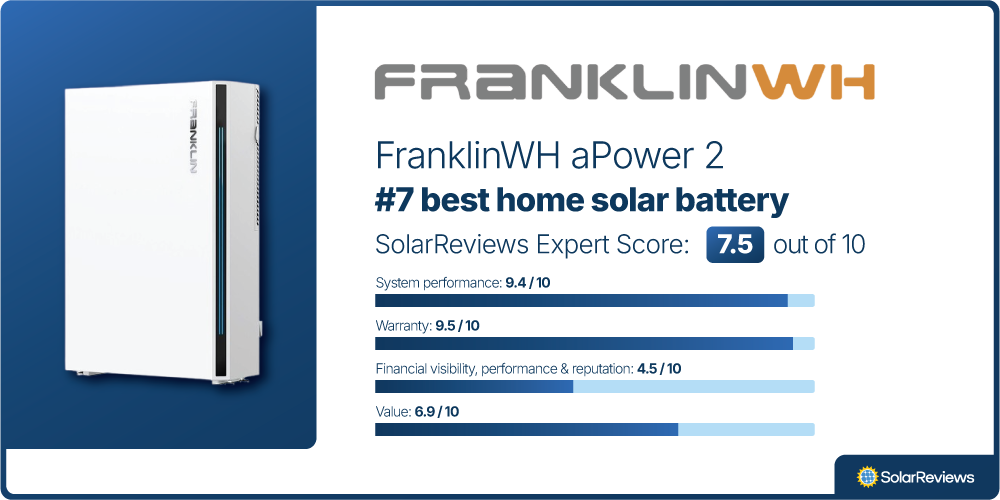
FranklinWH is the fourth most-used battery brand in the solar industry, according to our statistics. The company’s products are very popular among installers and homeowners who can afford a large energy storage system, but we found the company’s original home battery a bit underpowered.
Now, FranklinWH has introduced the aPower 2, which doubles the power output and increases energy storage to 15 kWh per unit. They’ve also announced the aPower S, which adds DC inputs for solar panels, a feature present in the best solar batteries.
#8: Qcells Q.HOME CORE
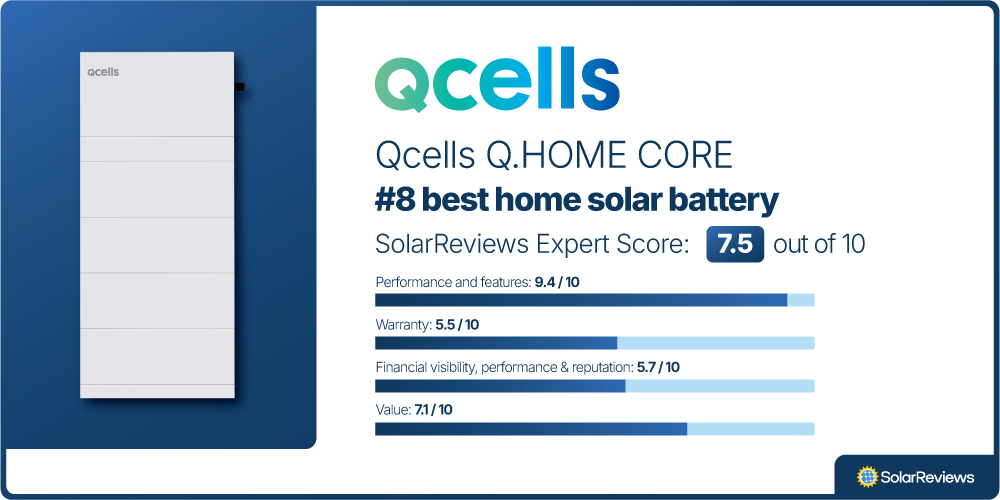
Qcells is another top solar panel brand that entered the battery business. The brand acts as a one-stop shop for homeowners, offering solar panels, batteries, its own solar financing, and even an installation company.
With its modular design and integrated solar inverter, VPP eligibility, and the included Q.HOME HUB backup gateway offering extended benefits, the Q.HOME CORE is a solid option for homeowners who want storage.
#9: Generac PWRcell 2
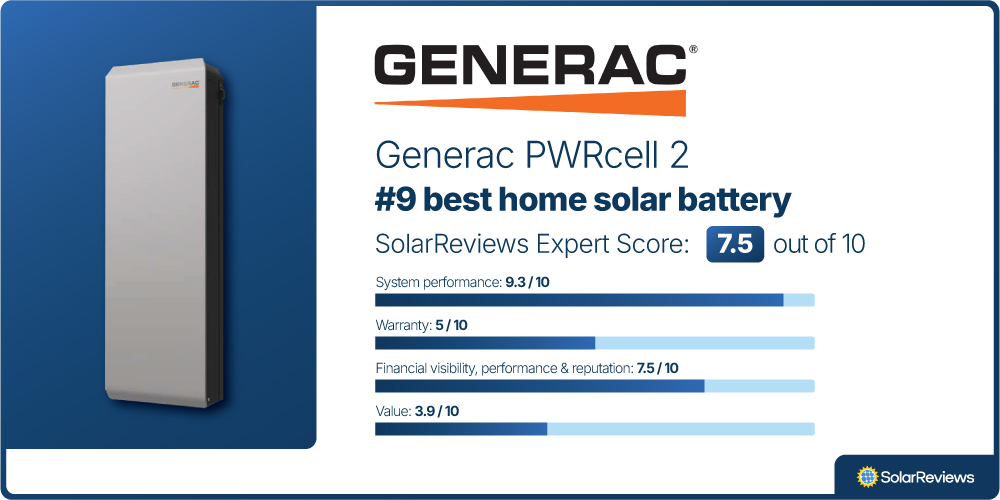
Generac’s original PWRcell batteries were essentially re-badged versions of the batteries produced by Pika Energy, a company that Generac acquired in 2019. The technology used in certain parts of the original PWRcell system had some flaws that caused widespread problems for the company.
To its credit, Generac has been working hard to remedy all issues with the original system, all while developing the PWRcell 2 from the ground up. The company’s newest home energy storage system offers some impressive capabilities and seamless integration with Ecobee smart thermostats.
#10: BYD Battery Box HVL
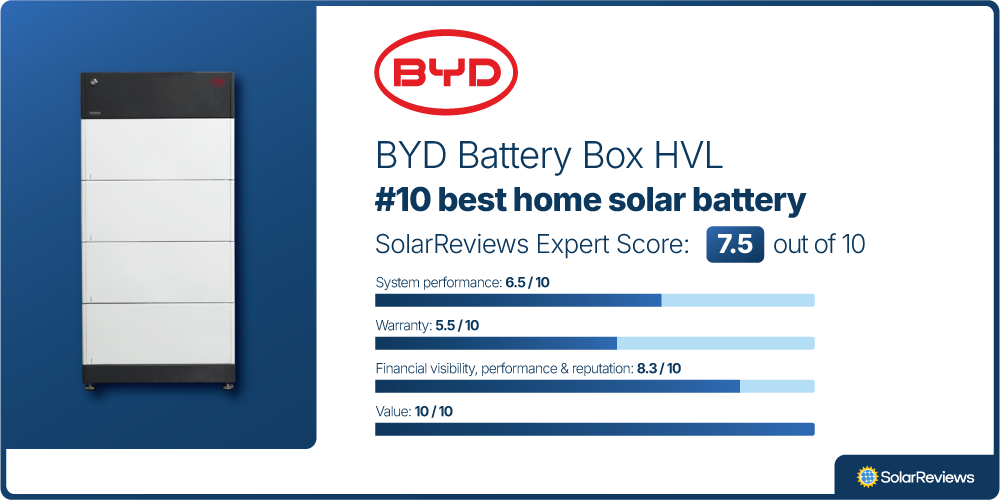
BYD is one of the largest battery manufacturers in the world, and its Battery Box line of stackable home batteries is available all across the globe. The Battery Box HVL is the company’s high-voltage battery entry for the U.S. and Canadian markets. It can be paired with inverters from GoodWe, Solis, and SMA to create an energy storage system that fits your needs.
Pros and cons of the best solar panel brands
Adding a battery to your home solar installation can be a complicated decision. First, you have to choose if you want backup power in an outage or just enough energy storage to offset some of your evening usage. Then, you have to decide which circuits in your home to back up and how much storage capacity you need.
The home solar batteries on the market differ a lot in how they can perform these functions.
Some are designed to accept DC solar power input, while others connect only to the AC wires from your home’s electrical panel.
Some are modular, meaning their capacity can be expanded easily by adding battery modules under a central inverter and/or management system. Others come in one size only, and you can only expand their capacity by purchasing two or more.
Some come with sophisticated additional functionality, like charging from a backup generator or managing home circuits with smart functionality.
Every battery on our list combines some or all of these functions to meet various needs. While we recommend all the brands on our top 10 list, we prioritize modular batteries that can charge directly from either solar DC or AC output and can be easily adapted to the needs of many different kinds of homeowners.
What factors determine the best solar batteries?
Every person and every home is different, so the best solar battery can change with your needs. You’ll need to know which battery specifications are important and how to evaluate them to find the right solar battery to reach your goals!
Our general advice is to trust expert battery installers to help you decide on the right battery. That being said, there are a few key features you should look for when choosing a solar battery backup system:
Cost
Energy capacity
Power output
Depth of discharge
Battery chemistry
AC or DC coupling
Mounting configuration and IP rating
Warranty coverage
Methodology: Our expert energy battery storage system rankings
SolarReviews’ battery rating methodology differs from other websites because we don’t simply rank performance and cost characteristics. In addition to technical specs, our team of solar experts emphasizes factors that encompass the company's success, which in turn provides long-term benefits to homeowners.
We also consider the value of the batteries on a dollar-per-kWh basis and examine the battery company’s popularity among installers to get a holistic view of which batteries are the best.
Here are the categories and weights of our battery ranking criteria:
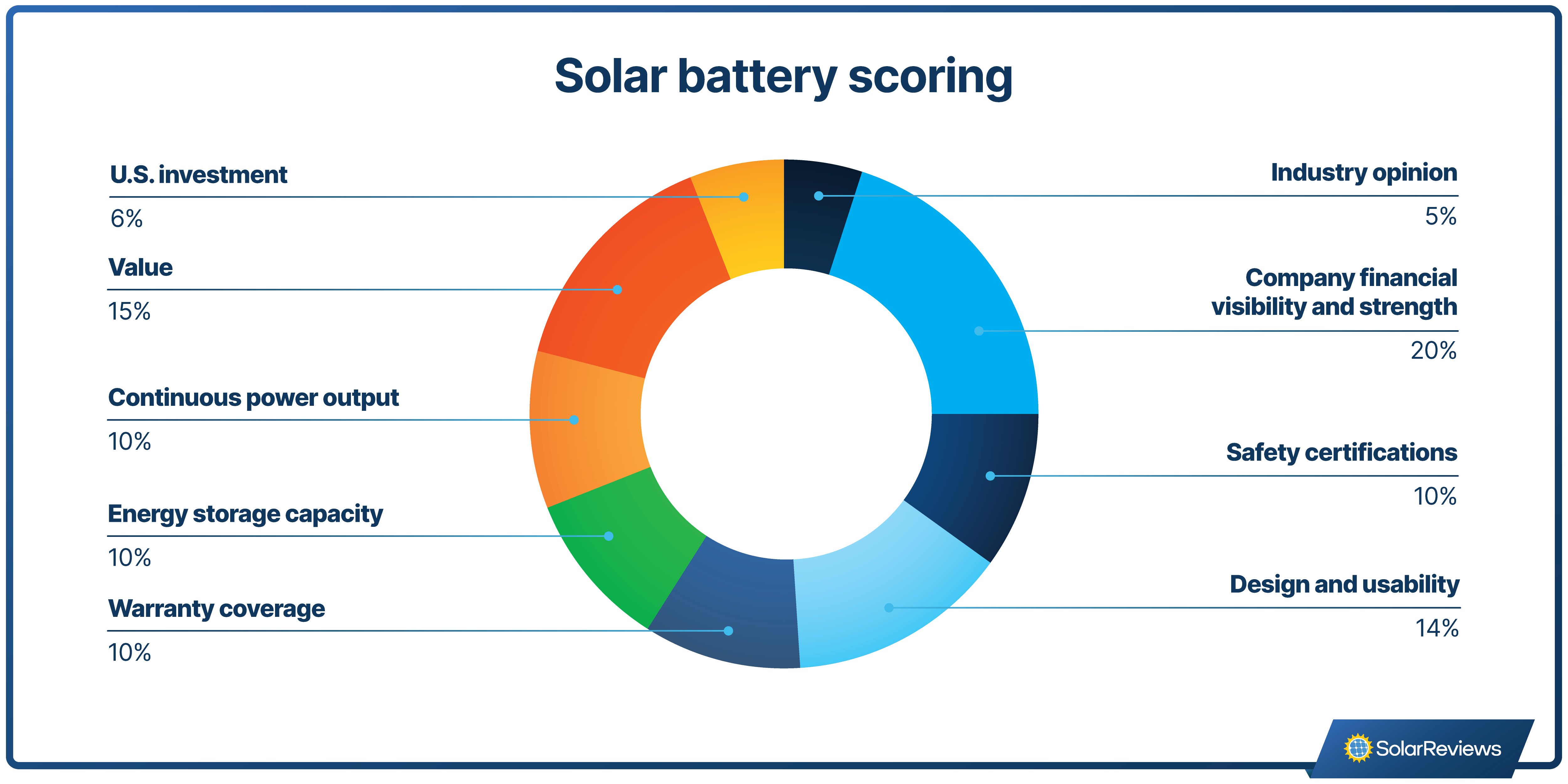
Company financial visibility and strength (20%)
This category offers the most points based on a manufacturer’s financial performance and transparency. Companies are awarded points for being publicly traded, publishing financial statements, and maintaining high revenue and profitability.
Value (15%)
For this category, we evaluate a battery system based on its cost per kWh of storage, including installation costs, but before any incentives. For DC-coupled batteries, we add the cost of a SolarEdge hybrid inverter to the evaluation to fully represent the cost compared to AC-coupled batteries that include their own inverter.
Design and usability (14%)
This category examines a battery’s design flexibility. Points are awarded based on expandability, modularity, indoor and/or outdoor rating, and AC-and/or DC-coupled capability. Virtual power plant eligibility is also considered.
Warranty coverage (10%)
The warranty is an extremely important evaluation criterion when it comes to batteries. Ten years has been the industry standard for a long time, but several companies now offer warranties of 12 years, and Enphase now leads the industry with a 15-year warranty. Companies get points for length and having cycle-life or total energy throughput clauses in their warranties.
Energy storage capacity (10%)
This category represents the total capacity for a typical home battery. In the case of modular batteries, we evaluate using the most common or most functional size for the average homeowner.
Continuous power output (10%)
Here, we look at a single battery’s ability to output continuous power. In the case of modular batteries, we evaluate a battery with the number of modules needed to reach the inverter's maximum output.
Safety certifications (10%)
Safety certifications ensure a product meets certain standards, providing peace of mind for both installers and homeowners. Points were awarded for the presence of specific UL and UN certifications.
U.S. investment (6%)
Our country needs home-grown businesses to bring us into a post-carbon world. This category tracks whether a company has offices or is based in the U.S., manufactures its equipment here, and regularly attends U.S. trade shows and industry events.
Industry opinion (5%)
Data for this category comes directly from our annual Solar Industry Survey. We ask installers which battery brands they will work with and award points weighted by the percentage of the industry that says they will install a company’s products. Full points are awarded to companies with at least 50% of installers saying they choose to install the battery.
Compare the best solar batteries of 2025
Brand/Battery | Estimated cost per kWh* | Storage capacity | Continuous power output | Warranty |
|---|---|---|---|---|
Industry average | $855 | 14.85 kWh | 7.6 kW | 12 years, 4,500 charge/discharge cycles |
Tesla Powerwall 3 | $750 | 13.5 kWh | 11.5 kW | 10 years, 2,800 cycles |
Enphase IQ 5P system (3 modules) | $820 | 15 kWh | 11.52 kW | 15 years or 6,000 cycles |
Panasonic EverVolt Home Battery (4 modules) | $810 | 18 kWh | 7.6 kW | 12 years or 6,000 cycles |
Canadian Solar EP Cube (5 modules) | $550 | 16.6 kWh | 7.6 kW | 10 years or 6,000 cycles |
Ankew SOLIX X1 (3 modules) | $650 | 15 kWh | 6 kW | 10 years or 3,290 cycles |
PointGuard Home Battery (2 8-kWh module) | $580 | 15.6 kWh | 11.4 kW | 10 years or 3,180 cycles |
FranklinWH aPower2 + aGate | $845 | 15 kWh | 10 kW | 15 years or 6,000 cycles |
Qcells Q.HOME CORE | $830 | 15 kWh | 7.6 kW | 12 years, 6,000 cycles |
Generac PWRcell 2 (6 modules) | $995 | 18 kWh | 10.3 kW | 10 years, 2,520 cycles |
BYD Battery Box HVL (4 modules, with Fronius GEN 24 inverter) | $690 | 16 kWh | 10.2 kW | 10 years, 2,525 cycles |
*Does not include installation and labor costs. DC-coupled models include the added cost of a 7.6 kW hybrid inverter
How long do solar batteries last?
Most home batteries are guaranteed to last at least 10 years, but many brands are starting to extend their warranties to 12 or 15 years. Battery warranties typically include a number of discharge cycles or energy throughput, as well.
Batteries will continue to operate after their warranty period. Exactly how long your battery will work depends on its chemistry and how it’s used. For example, a battery that is completely drained more than once a day won’t last as long as one that’s used once a week.
Keep in mind that batteries age and store less energy. Think about your smartphone battery—it probably doesn’t hold a charge quite like it did when you first got it. The same thing happens with solar batteries. Most battery warranties outline how batteries degrade with use and how much energy they can store over time.
Solar batteries have a shorter lifespan than solar panels, so you may have to replace your battery over the 25-year lifespan of your solar power system. Consider this when calculating the return on your solar investment and deciding on your financing options.
Are solar batteries worth it?
Most homeowners don’t need a solar battery, but it can be beneficial to some. From a financial perspective, there are very few cases where solar batteries are worth it.
If you live in an area that experiences frequent, prolonged power outages, home battery backup systems can keep your most important appliances running for a few days. When paired with solar panels, a battery could keep them running indefinitely without the utility.
Batteries can also be helpful in areas where solar buyback rates are low, net metering is not available, or utilities require time of use rates. In these cases, batteries can save a bit of extra money on your utility bill, but the savings are likely too low to ever see a real return on your investment.
Overall, whether or not you need a solar battery storage system depends on what matters most to you! For some homeowners, the peace of mind of having backup power is worth the upfront cost. The best way to figure out the best battery solution for you is to speak to a local solar installer who can assess your energy needs and map out how a battery can benefit you.
Best solar battery backup FAQs
Ben Zientara is a writer, researcher, and solar policy analyst who has written about the residential solar industry, the electric grid, and state utility policy since 2013. His early work included leading the team that produced the annual State Solar Power Rankings Report for the Solar Power Rocks website from 2015 to 2020. The rankings were utilized and referenced by a diverse mix of policymakers, advocacy groups, and media including The Center...
Learn more about Ben Zientara